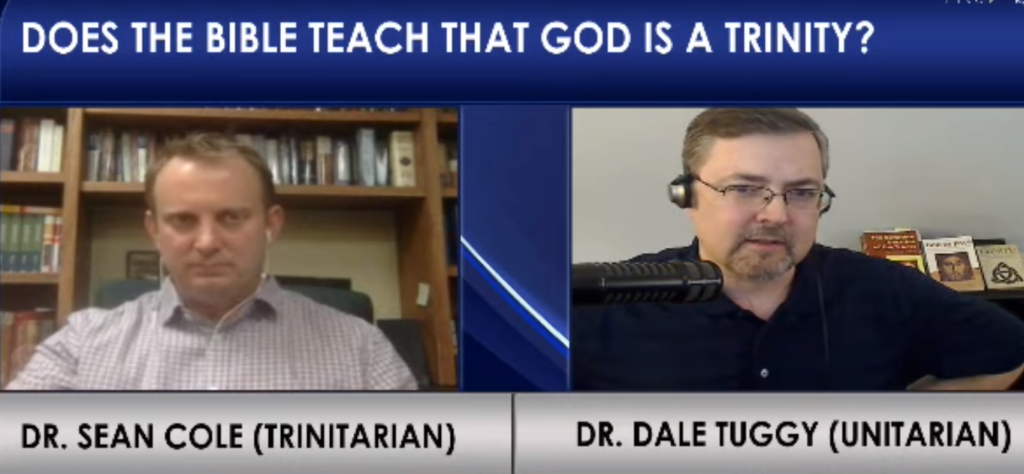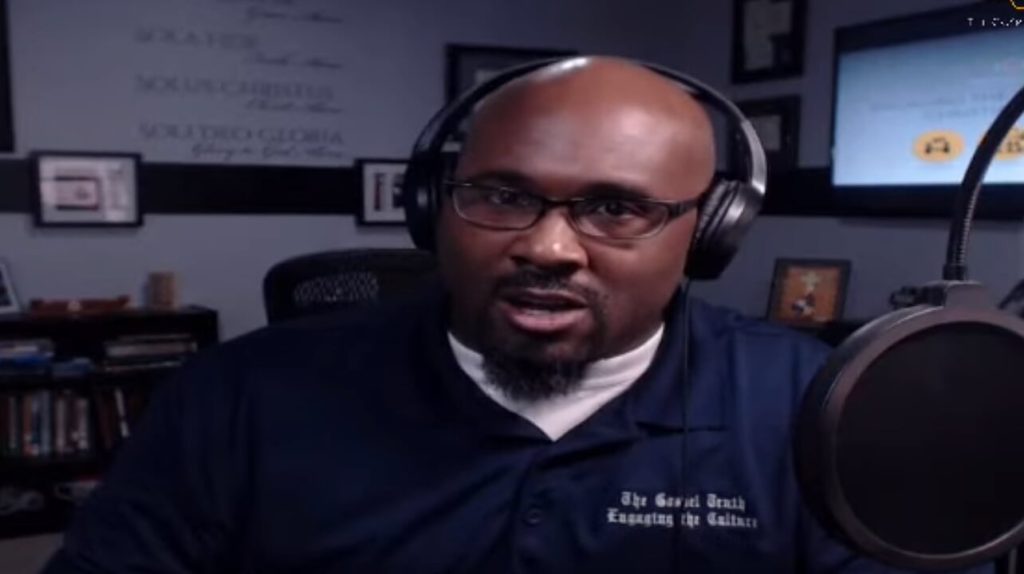Podcast: Play in new window | Download
Subscribe: Spotify | Email | RSS

In this first part of my dialogue with pastor Sean Cole, we introduce ourselves, offer brief opening statements, and then we discuss which Trinity theory he thinks is taught in scripture, and how we understand the famous first chapter of the gospel according to John. In his opening statement Dr. Cole essentially expresses some core convictions of catholic traditions about the Father, Son, and Spirit, and appeals to the famous “Great Commission” passage at the end of Matthew. I base my opening case on four indisputable facts about the New Testament – that these facts best fit my thesis that the New Testament authors are unitarians, that is, Christians who think that the one God is Father alone, not the Trinity. These facts are:
- No word or phrase in the New Testament was then understood to refer to a truine/tripersonal God.
- In the New Testament “God” almost always means the Father – never the Trinity and rarely if ever the Son or Spirit.
- The New Testament pattern of worship: the Father (aka God) is the main and ultimate object of worship. The exalted Son is also worshiped, which glorifies God. (Philippians 2:11) Neither the Trinity nor God’s spirit are ever taught to be or portrayed as an object of worship.
- The New Testament contains many statements which imply that the Son has limits which are incompatible with his being fully divine. E.g. that he was begotten in his mother, died, didn’t know the day or hour of his future return, he has a god over him, he gets his mission, message, and power from God.
If you accept some triune-God theory, how do you explain these four facts?
Next week: the rest of my dialogue with Dr. Cole.

Links for this episode:
- Marlon Wilson’s The Gospel Truth show
- The Gospel Truth episode 64: Does the Bible teach that God is a Trinity?
- Dr. Sean Cole homepage, his podcast “Understanding Christianity”
- What is the Trinity?
- three-self Trinity theories
- Trinity to One – An Evangelical’s Journey – Dale Tuggy and J. Dan Gill
- podcast 2 – the “Athanasian Creed”
- podcast 260 – How to Argue that the Bible is Trinitarian
- podcast 248 – How Trinity theories conflict with the Bible
- podcast 276 – How is the Trinity Central to the Gospel? Or: How The Gospel Coalition Prioritizes Speculation over Scripture
- the apologetics blind-spot on numerical identity
- podcast 189 – The unfinished business of the Reformation
- podcast 224 – Biblical Words for God and for his Son Part 1 – God and “God” in the Bible
- podcast 227 – Who Should Christians Worship?
- podcast 145 – ‘Tis Mystery All: the Immortal dies!
- “Divine Deception and Monotheism,” Journal of Analytic Theology 2, 186-209, 2014.
- podcast 259 – Who is the one Creator? – Part 2
- Matthew 28:16-20; 1 Corinthians 8:4-6; John 5:43-44; John 8:54; Acts 7:55-56; 1 Timothy 2:5, Ephesians 4:5-6; John 1; Proverbs 8:22-36; Sirach 24:1-23; Psalm 33:6; Wisdom 18:14-16; Baruch 3:37-4:1; John 8:40; John 17:3; John 20:28; John 1:18; 1 Corinthians 15:28.
- This week’s thinking music “Mt. Fuji” by Timecrawler 82.

The metaphorical word was in the world, and the world was made by the metaphorical word, and the world knew not the metaphorical word.
Pure nonsense.
“He was in the world, and the world was made by him, and the world knew him not.”
What is Mr. Tuggy’s unitarian exegesis of this text?
Why do Unitarians make John 1 so complicated to get to their understanding of things? To avoid the painful truth perhaps?
Why do they need Proverbs, personification and other things extraneous to the text to explain the Logos?
Doesn’t the text itself tell us enough to know who and what he is? Am I missing something?
When Jesus says that the Father is the one true God isn’t that the truth from his point of view?
Does it have to be from ours? Doesn’t the incarnation put him at a unique vantage point?
Who else could have been his God and how many gods could he have under the law? Only one I assume.
Is God the Father as a title only used and introduced in the NT because of the incarnation? It looks like it to me. So it can’t be projected back on to the OT as Mr. Tuggy is fond of doing. It can’t be made equivalent to Jehovah because it signifies a NT event.
The Trinity is a pure invention of Nicea and is even contrary to the teachings of the gospels. The Trinity is in reality a DUALITY. The almighty God cannot be here for logical reasons, this is why He is in the PAST (perfectly almighty from there) “the world has not known you”. Thus, He can be present here now only in the form of a spirit. This is why in the Creation everything has been PERSONALLY made by Him (water, stars…) and now it’s NOT POSSIBLE anymore (everything is now made by his Spirit). His Spirit is no “third God Person”, is the Spirit of God HIMSELF ! “God is a spirit”. Didn’t you notice that neither the Father nor the Son ever talk to an alleged “third God-Person”? “My Father is always at his work to this very day, and I too am working.” Thus, just TWO GOD-PERSONS. God is in the past, all sentences regarding his Person refer to the past , “You lovED me BEFORE THE WORLD BEGAN”). Only then that happened, in the past, NO LOVE from the almighty God beyond that point of time ! When Jesus was baptized the Spirit of God, that is “God who is a spirit” simply said “…my beloved Son…”, that’s all. “Holy Spirit” and the “Spirit of God” are synonyms (see the gospels).
How about the “plural of majesty” invention in genesis 1 26?
Enjoyed part 1, looking forward to part 2. Thanks Dr Tuggy!!
I will added 4 additional points on John 1 in support of the Unitarian case.
1. poetry genre of the prologue. It’s chiasmic structure is well recognised by Trinitarian scholars. Not only does verses 1-18 make one big chiasm, verses 1-2 also contains a second chiasm as well as an anadiplosis. Within the genre of poetry, a literal reading should not be the default. “The word became flesh” is poetic language. Jesus as the metaphorical embodiment of the word is perfectly acceptable.
Also, in Incarnation theory, verse 11 happens chronologically after verse 14. Trinitarians usually appeal to poetry (chiasm) to resolve this issue.
2. Jesus as the metaphorical word is John’s way of identifying Jesus as the Deutoronomy 18 Prophet Messiah. He clearly states the purpose of his gospel in John 20:31, and repeated the Prophet Messiah theme numerous times throughout his gospel.
Trinitarians read Jesus as the word literally, thereby isolating the prologue from the rest of the gospel. Ironically, the same scholars see the prologue as a theological summary.
3. Return of God’s spoken word. The Jews believed that the word of God had departed from them (Amos 8:11). To present Jesus as the Prophet Messiah, John began by reintroducing the word, which has now been embodied in the person of Jesus.
4. Even if we grant Jesus to be a God in verse 18, there are two different Gods (by identity) in the prologue.
Since the concept of a tri-personal God is absent in Scripture. This Trinitarian solution must have arose in recognition that Scripture presents multiple Gods.
Hello,
This are very good points.
Do you have an article, a book or a video you could recommend on this Topic?
Thank you.
Hi Daniel – my book should be helpful, at least if you are a trinitarian and trying to make sense of that. https://www.what-is-the-trinity.com/ For for detailed arguments that NT theology is unitarian and not trinitarian, see trinities podcasts 189 and 248-250. https://trinities.org/blog/podcasts/
Comments are closed.